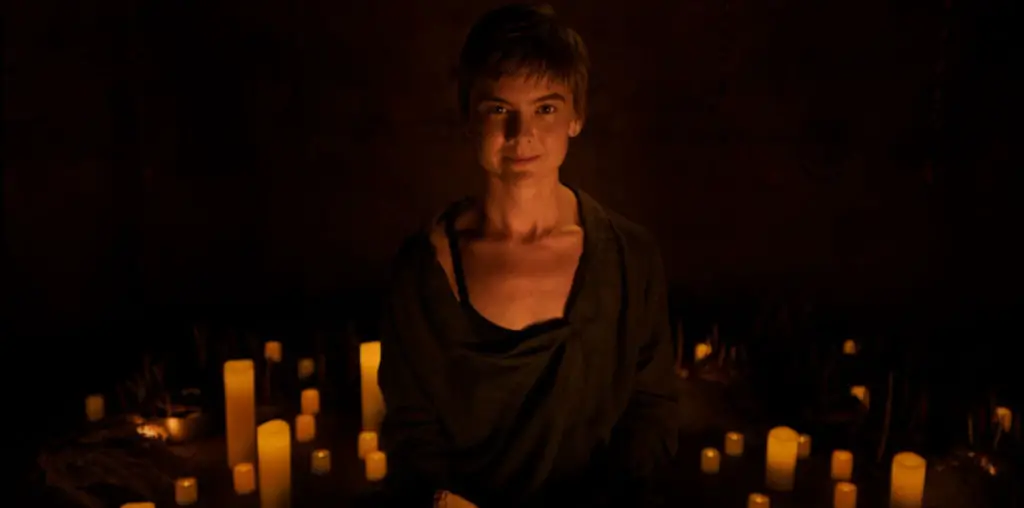
Despite having a healthy decade-long career that’s had more than its share of well-played unglamorous roles (“Jungle Fever” and “Losing Isaiah” come to mind) and one very glamorous role that earned her much acclaim, including no less than a Golden Globe, an Emmy, and a Screen Actors Guild Award (as the title character in “Introducing Dorothy Dandridge”), Halle Berry continues to be celebrated more for her staggering beauty than her undervalued acting talent. That should change for good with the release of Marc Forster’s somber and involving “Monster’s Ball,” in which Berry delivers an extraordinary performance that will startle even her most faithful fans.
Berry has said that she had to fight for the part of Leticia Musgrove, for director Forster initially did not want to meet her regarding it. Indeed the role isn’t one would think to cast her in: waitress Leticia is the overworked, emotionally spent mother of 10-year-old Tyrell (Coronji Calhoun) and wife of Lawrence (Sean Combs), who, as the film begins, is hours away from his execution by electric chair in a rural Georgia prison. The audience never learns what Lawrence did, but that is beside the point, for his imminent death is just the first of many traumas Leticia faces throughout the film’s run time. She refuses to be written off as a victim, gamely attempting a strong, sometimes angry and very unlikable face that ultimately cannot suppress the great pain within. It’s a tricky part, and Berry handles each difficult emotional moment with precision and intensity–whether it be lashing out at her son’s gluttonous eating habits, quietly telling Lawrence how tired she is of the prison visit routine, or begging for a moment of pleasure from a man between gut-wrenching sobs. That last scene is the film’s most talked-about, but for the wrong reasons; yes, Berry bares her body on screen for the second time in a matter of months, but her soul-shattering depiction of suffering is what lends the moment such impact.
“Monster’s Ball” isn’t just Leticia’s story, but also that of Hank Grotowski (Billy Bob Thornton), a second-generation corrections officer who, along with his not-so-beloved, also-officer son (Heath Ledger), also served on Lawrence’s execution team. In addition to his occupation, Hank also inherited his racist beliefs from his father (Peter Boyle), now an invalid who has to breathe from an oxygen tank. But Hank himself is soon finds himself facing a personal tragedy, and gradually he starts making changes in his life. The greatest change is yet to come, not long after he steps into a diner–Leticia’s diner.
As a story about two people grasping onto each other in the face of overwhelming loss, “Monster’s Ball” is quite moving. Forster, writers Milo Addica and Will Rokos, and the brave leads create two flawed characters that are far from the most pleasant to watch–which hence make them all the more believable as real people; the tentative development of their relationship also plays out realistically, with awkward silences often outnumbering the meaningful words spoken. If Forster, Addica, and Rokos had left the film at that, they would’ve had one of the year’s most powerful achievements. But they set their sights a bit higher, attempting to make some sort of grandiose statement on racial politics. Granted, racism does play an integral part in the story, but more lofty ambitions fall short when a number of heavy-handed touches are brought into the picture. Case in point, is the fact that Hank likes his coffee black and loves to eat chocolate ice cream–and always with a plastic spoon, which inevitably turns out to always be (wink wink) white–supposed to be some sort of “clever” foreshadowing that he has the capacity to change?
No matter. If Forster and the writers aren’t quite able to reach the heights they shoot for, the stars exceed any and all expectations–particularly Berry. “Monster’s Ball” as a whole may ultimately be just a solid little picture, but her performance is downright astonishing, and if for nothing else the film will be remembered for that.
